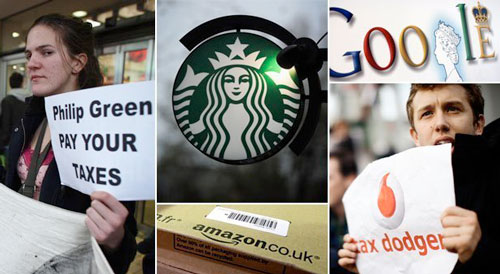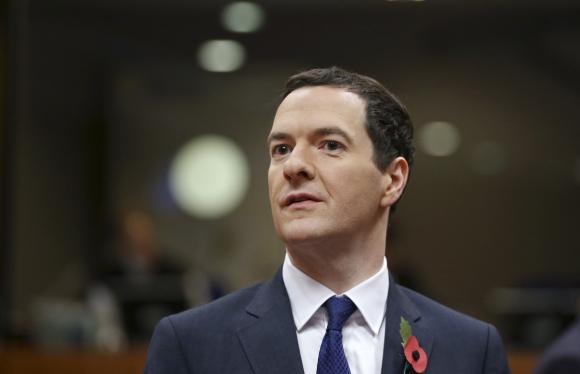Business lobby warning on chancellor’s new ‘Google tax’

The Confederation of British Industry has warned over Chancellor George Osborne’s plans for the UK to “go it alone” on corporate tax reform.
The Organisation for Economic Cooperation and Development is already putting together a plan for tackling the most aggressive tax schemes.
CBI boss John Cridland said action by the UK outside that process would “be a concern for global businesses”.
Mr Osborne claims his crackdown will raise £1bn from multinationals.
Tax campaigners say tax reform to prevent international companies from paying low tax is hard, but possible.
John Cridland, CBI Director-General, said: “International tax rules are in urgent need of updating, but the decision for the UK to go it alone, outside the OECD process, will be a concern for global businesses, and moving the goalposts on offsetting losses risks creating a worrying precedent.”
Mr Osborne’s proposal has been called the “Google tax”, but Google is certainly not the only large company accused of using the magic of international accounting to shift profits around the globe. The allegation is that the bulk of those profits often end up in low-tax regimes, even if an unsophisticated observer can’t see how they were earned there.
Apple, Amazon, Starbucks and several others could have the UK tax collector’s hounds on their trail – if the chancellor’s plans work.
These companies are doing nothing that is illegal.
It was avoiding tax, not evading it, that Mr Osborne tackled in the Autumn Statement.
The problem
A recent Financial Times analysis of seven US technology giants found they paid just £54m in UK corporate tax in 2012, even though their overall sales to British customers totalled $15bn.
The problem is no-one really knows what Mr Osborne’s solution is.
One thing is for sure – he did little on Wednesday to explain how a Diverted Profits Tax worked.
This is what he did say: “Today I am introducing a 25% tax on profits generated by multinationals from economic activity here in the UK which they then artificially shift out of the country.”
“This new Diverted Profits Tax will raise over £1bn over the next five years.”
And that was about it.
“The decision for the UK to go it alone, outside the OECD process, will be a concern for global businesses, and moving the goalposts on offsetting losses risks creating a worrying precedent”
John CridlandDirector-General, CBI
So, what could the government do to bring in the £1bn that it is looking for?
Ahead of the curve
The UK is already no slouch when it comes to talking tough on tax avoiders.
The OECD is developing an Action Plan on Base Erosion and Profit Shifting or BEPS (what you and I would call aggressive tax avoidance) and the chancellor never wastes an opportunity to voice his support for it.
But the action plan still has a way to go and won’t be completed for another year. Mr Osborne is ahead of the curve.
That’s not necessarily a good thing, say some observers.
Kevin Hindley, managing director at professional services group Alvarez & Marsal Taxand, said: “We thought the government would do something like this, as part of implementing the OECD proposals, but not so soon.
“It really is superseding what is happening internationally and it is a bit of a surprise that it’s happening without consultation or discussion with business.”
Then again, Mr Osborne has an election to fight in May 2015, so he may not want to wait for all the other members of the OECD to catch up.
Country by country
One thing that is likely to be crucial to his new tax is another OECD initiative: “country by country” reporting.
When you read most multinationals’ reports you will find profits pulled together into global or regional areas. “Country by country” reporting would force them to break down their results for each country.
The UK was the first of the 44 countries involved in the proposals to formally commit to this new regime.
So tax jurisdictions will now get a chance to see exactly where profits are coming from.
That raises great opportunities to claw back tax – but problems too.
One of the opportunities is outlined by economist and tax campaigner Richard Murphy. He calls it Unitary Apportionment Taxation. In effect it would mean using “country by country” reporting to work out where sales were made and then dividing the taxable profits accordingly.
So if 10% of sales from a multinational came from the UK, HMRC would be entitled to tax 10% of the profits.
Sales
But even Mr Murphy concedes that he would be “amazed” if it happened: “The OECD has already ruled this out as an option. But it would be a revolution in taxation – and in global taxation – if George Osborne goes down this route.
“If he did it, it would also mean an enormous row with the US. American companies would go ballistic over it.”
Mr Hindley explains that sales are not necessarily a good way to apportion tax. He said: “If one company had large sales of low-margin, low-profit, goods to one jurisdiction, they could end up being taxed more than a company that say, had low sales but high-margin profits coming from the same country.”
This is the argument used by Starbucks who claim that, despite its large sales to the UK, “we have found making a profit in the UK difficult and therefore have not been in a position to pay much corporation tax”.
Mr Hindley said there were other methods to impose a Diverted Profits Tax, such as through withholding taxes – a tax deducted from an internal payment – or by denying companies the ability to deduct tax when paying royalties to other parts of their organisations.
But he added that it was impossible to know how such rules would interact with existing double taxation agreements and regulations over transfer pricing (that is the pricing of goods between different parts of a company) and he said that “speculation will be rife over the coming weeks”.
Source: bbc – Business lobby warning on chancellor’s new ‘Google tax’




























